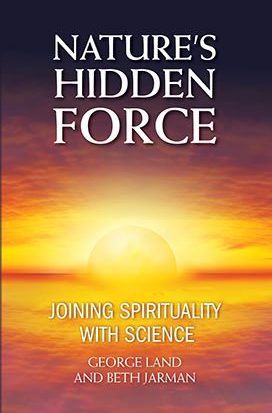
By George B. Kauffman
Nature’s Hidden Force: Joining Spirituality with Science by George Land and Beth Jarman, Humanist Press, Washington, DC, 2014, paperback $14.99. ISBN 978-0-931779-49-7
In its revolutionary re-examination of the scientific principles of entropy, this book presents a new viewpoint on the debate between science and spirituality that should appeal to the religious and non-religious alike. Kirkus Reviews stated that it “shows how the universe’s disorder ultimately leads to order and personal completion.” Foreword Reviews described it as having “profound implications for all areas of human endeavor, from education to economics, from how we care for the environment to how we can continue to maintain hope in our hearts.”
By revisiting the work of Rudolf Clausius (1822-1888), the 19th century physicist who first presented the theory of entropy, the idea that the universe is irreversibly headed toward a whimpering “heat death,” Land and Jarman scientifically show in easily understandable terms that the entire concept is based on a gross misunderstanding of how matter and energy actually function. They assert that the universe is not falling apart but instead is getting better all the time!
Nature’s Hidden Force is full of insight not only for the scientific community but also for those seeking spirituality. Land and Jarman describe nature’s impulse for overcoming entropy as a kind of “Creative Connecting,” a force as real as gravity and as worthy of reverence as any deity. They ultimately prove that no one needs to give up on science to be truly spiritual; you just have to get it right. You don’t need to be ashamed of your own spiritual side if you want to live your life according to empirical reality. You just have to revere the force in nature that really exists. Nature’s Hidden Force is perfectly in tune with the third of Americans who call themselves “spiritual but not religious.”
George Land, the general systems scientist who discovered transformation theory, is the author of Grow or Die, the Unifying Principle of Transformation (Random House: New York, 1973), a “Main Selection” of the Saturday Review Book Club. Beth Jarman, the coauthor of this new Humanist Press book, is also coauthor (with George Land) of Breakpoint and Beyond (Harper and Harper Perennial: New York, NY, 1992). Her broad-based experience includes six years as an educator, state legislator, and CEO of The FarSight Group.
*****
George B. Kauffman, Ph.D., chemistry professor emeritus at California State University, Fresno and Guggenheim Fellow, is recipient of the American Chemical Society’s George C. Pimentel Award in Chemical Education, Helen M. Free Award for Public Outreach, and Award for Research at an Undergraduate Institution, and numerous domestic and international honors. In 2002 and 2011, he was appointed a Fellow of the American Association for the Advancement of Science and the American Chemical Society, respectively.
